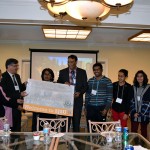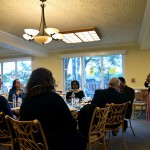- Four members of the Pakistani Student Association, right, present a poster welcoming Pakistani educators to SJSU.
- Mark Adams, the program director of PDEEP, introduces visitors from Pakistan on Nov. 6.
- Shabnam Shahid talks about the partnership between SJSU and Allama Iqbal Open University.
San Jose State University’s College of International and Extended Studies hosted a lunch to welcome a handful of visitors from Pakistan’s Allama Iqbal Open University on Nov. 6. The Pakistani educators are working with CIES staff, administrators and SJSU faculty from other colleges on the Pakistan Distance Education Enhancement Program, with funding from the U.S. State Department.
The goal of the PDEEP partnership is to support instructors at the Pakistani university in developing online and hybrid classes. Many of the students who are served in the program are women who are unable to travel to a university due to familial responsibilities or cultural barriers that prevent women from seeking higher education as well as rural residents without the means to attend a university.
CIES Dean Ruth Huard is the principal investigator on the grant while Mark Adams serves as the program director.
“Three or four years ago, Mark and I were finishing up work at 7 or 8 p.m. and we saw this opportunity,” Huard said, of the PDEEP grant. “We said, ‘Wow, this is great. But we don’t have time to do it.’ Then we said, ‘We have to do it.’”
In the three years since SJSU received the grant, Adams said there have been two dozen faculty exchanges, 15 workshops and multiple sub projects to build distance education capacity.
Dr. Nasir Mahmood, of Allama Iqbal Open University, said the institution serves more than 1.2 million students through a distance program in which they send printed learning materials directly to the homes of students.
Mahmood said with PDEEP, they are initially using degrees such as the master of philosophy, similar to a master of science in the U.S., and doctorate programs which have 10-20 students enrolled to serve as a pilot. He acknowledged some of the infrastructure challenges in bringing education to all with the new model.
“There are power shortages in some places that can last eight hours,” he said, of the infrastructure. “We struggled with how to connect people together as many students do not have access to the internet. They are not used to the interfaces.”
From the main goal of expanding online and hybrid curriculum, some other projects have evolved. Minna Holopainen, an SJSU communication studies professor, has been working with PDEEP on Collaborative Online Intercultural Studies. Through COIL, SJSU students and Pakistani students interact via teleconferences including an exchange between students enrolled in math courses.
“COIL caused stereotypes to melt away,” Adams said. “It hasn’t been a one-way benefit. We have learned so much expertise from so many faculty.
Afshan Huma, a faculty member in educational planning policy and leadership in Pakistan, said she was not initially involved in the project but she was intrigued every time her colleagues met about PDEEP. She said she had the chance to study in the United States and in the United Kingdom. She described Pakistani education as teacher centered and content centered, but her experience abroad showed her an educational system that is focused on students. She said she recognized that not all students will have the chance to study abroad as she has.
Huma signed on recently to be an active partner in the hopes that her students will benefit from engaging with people who have a different perspective.
“I believe them having an international interaction will have a positive effect,” she said.
SJSU students from the Pakistani Student Association were invited to the luncheon. Sami Ullah, an electrical engineering student, said he got involved with the Pakistani Student Association because he hadn’t met any students from his own country when he arrived at SJSU. He said he liked that his professors have worked for companies in the Bay Area and can share first-hand experience. At the start of the program, Ullah and three other students presented the visitors with a poster and welcomed them to the United States. Other visitors included Dr. Tanveer Afzal and Shabnan Shahid, along with Richard Boyum, the University Partnerships coordinator for the U.S. State Department.
Read more about Pakistan Distance Education Enhancement Program.


